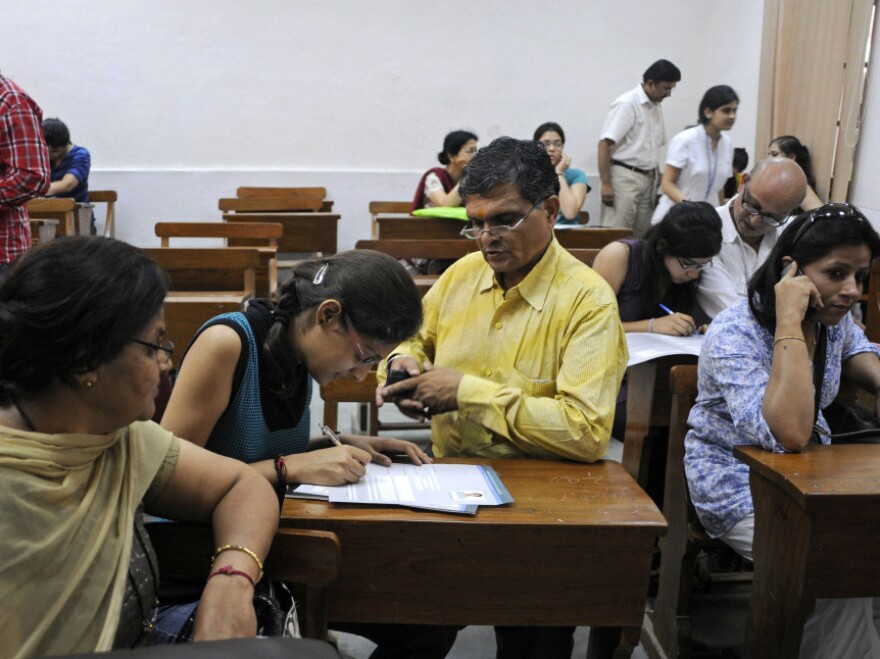This can be a harrowing time for high school seniors and their parents in the U.S. as they wait to hear from college admissions offices. But the pressure can be equally intense, if not more so in India, where the massive number of applicants and one make-or-break exam keeps students on edge.
Admission to Delhi University, one of India's most prestigious schools, is considered as tough, if not tougher than the process at many leading schools in the U.S.
"It's a very difficult game, given the numbers," says Dinesh Singh, the vice chancellor of Delhi University.
India has 1.2 billion people, he notes, and like most things in Indian life, getting one of the limited places at the best colleges is incredibly competitive.
There's no way you could interview all of them. It's very difficult to give weight to other aspects of a student's career, and so you largely rely on the test scores.
Delhi University is an amalgam of 80 different colleges in the Indian capital, India's equivalent to Oxford and Cambridge in Britain or the Ivy League schools in the U.S.
All told, Singh has about 50,000 slots to fill with incoming students each year. It may sound like a lot, but it's just a small fraction of those applying.
For example, Delhi University's Shri Ram College of Commerce has just 400 slots and gets some 28,000 applicants each year. That means less than 2 percent of the applicants get in, an acceptance rate far lower than Harvard's.
The numbers are so large that most college admissions are based on a student's performance on a single set of exams.
"There's no way you could interview all of them," Singh says. "It's very difficult to give weight to other aspects of a student's career, and so you largely rely on the test scores."
Students complain that making college admissions dependent on a single set of test results is like gambling your career on a single throw of the dice.
Some Opt To Look Abroad
Saumya Swaroop is one of a growing number of students who are side-stepping the Indian system.
"It's because the system never made any sense to me, to be frank," she says, "because how can they actually judge the merit of a student on the basis of what happens in a six-hour-long exam?

Swaroop didn't even apply to India's top universities, aiming instead for American schools. She wound up winning a scholarship at Princeton.
Swaroop says India's top schools may be missing talented students who have a lot to offer but simply can't make the cut.
Many of the candidates for India's top colleges come from exclusive private high schools such the Delhi Public School.
Principal D.R. Saini graduated about 1,000 seniors last year, and he says more than 400 qualified for top foreign universities, including prestigious colleges in the United States.
Saini says that group included students who couldn't get into Delhi University.
"At the local level, our students have not been recognized and honored, and they have not been allowed to get admission," he says, "but at the global level, in the very best universities of the world, our students are competing and getting very desirable results."
The Numbers Keep Growing
The problem is not going to get any easier. More than 120 million Indians will reach college age in the next few years.
Saini says he supports efforts by India's education ministry to come up with more holistic ways to judge a student's performance.
Most colleges are already trying to get away from the exam-only system by offering places to students who come from underprivileged groups. They also relax the rules for talented athletes and students in the arts.
Delhi University's Dinesh Singh says there are far more opportunities open at lesser-known but equally worthy colleges that are part of his own institution. The problem, he says, is that Indian parents, like many in the United States, are obsessed with the most prestigious university brands.
"Parents insist and force their children to only try for those places," he says.
One way to ease the demand for top-flight education might be to allow foreign universities to establish branches in India. India's Cabinet is considering legislation that could make that possible.
Copyright 2020 NPR. To see more, visit https://www.npr.org.


